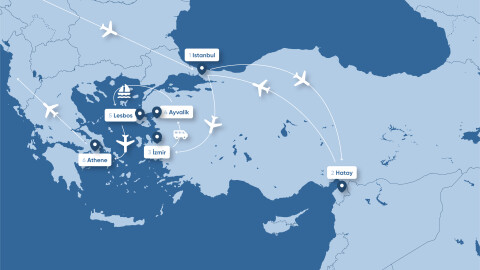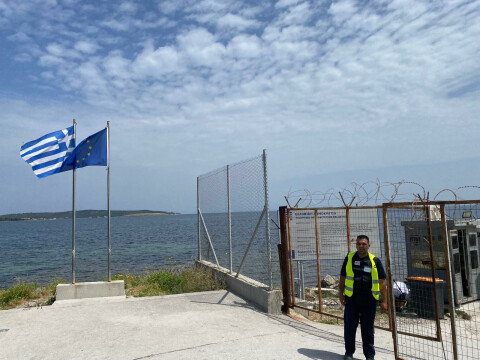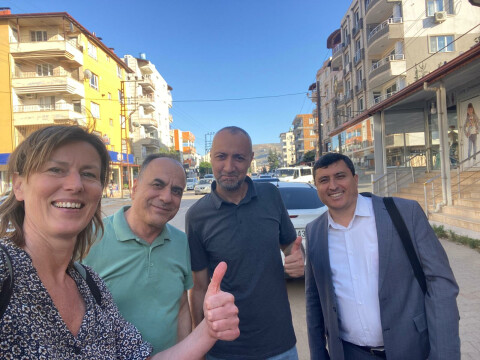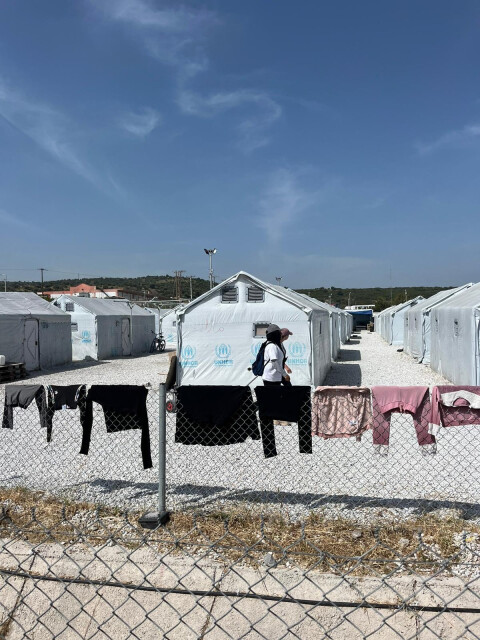
May 24th 2024
Field trip Turkey and Greece: “Tell our story”
- Turkey
- Greece
When you work at Refugee Talent Hub – and I have been doing so for six years now with great pleasure – you are constantly in different 'worlds': that of employers, that of newcomers in the Netherlands, that of NGOs and that of broader society. But there is a whole world out there. A world that influences our work, directly or indirectly. I went on a field trip to take some distance and zoom out. And I zoomed in on a context that I mainly knew from stories of colleagues and candidates.
Please note: this article was translated using a translator appOver the past two weeks I traveled through Turkey and Greece. I spoke to refugees, NGOs, employers and people I met by chance. I wanted to find out more about the journey that many of the people we speak to at Refugee Talent Hub have been on – literally and figuratively. A large number of them come from or through Turkey, and then travel further into Europe via Greece. So I went to Turkey (Istanbul and the Hatay region, near the Syrian border) and to Greece: Lesvos and Athens.
Tomorrow I will be back in the Netherlands. The trip has led to two notebooks full of impressions, a head full of ideas and a body full of energy to get back to work. Not everything has been given a place yet. But I would like to share some first general impressions.
The absurdity of borders…
Boundaries are funny things. I come from the Achterhoek; if you miss a turn there, you are in Germany. And then you turn around again, no problem.
Rami experiences it a little differently. Nour, Zeynab and a number of my own colleagues in the Netherlands also have a different view of borders. Of course I know that, I'm not crazy and besides, I've been working for years with people who don't cross borders easily. Its idiocy and visibility struck me, on the border of Turkey and Syria, in the Hatay region hit by the February 2023 earthquake.
There, in Hatay, I met Rami. A cheerful, open man who works at a local partner of the Refugee Foundation. We get along well. Rami lives in Antakya and works in Reyhanli – that is about 45km, so approximately the distance Amsterdam - Utrecht. Every day he drives up and down, right past the fence on the Turkish-Syrian border. He sees Syria, from the road you look out on a mountain with a Syrian village. His parents live in Syria, nearby, but he cannot go there.
That fence... It seems like a simple fence, but it is hard to believe that it is so well constructed over the entire length that you really cannot get through it. But it certainly is, the people who know can tell me. I only see a few kilometers of it and realize that there are thousands of kilometers of this type of fencing worldwide, 1800 km in Europe alone . You know it, of course you know it. Geopolitics and all that. But when you see it – really see it – and think about its length for a moment, the absurdity hits you on the head.

…and the power of the passport
And that's not even the European border. I cross that border a few days later. The ferry crossing from Ayvalik in Turkey to the Greek island of Lesbos is a pleasant tourist boat trip. (For example: Lesbos and Turkey are so close that the telephone provider Odido notifies me several times a day on Lesbos that I am in Turkey.)
The boat trip was about as long and just as comfortable as the boat to Schiermonnikoog in good weather. Sunglasses on, coffee, beautiful view… For me, with my Dutch passport. It certainly wasn't for my colleague Salar, years ago.
On Lesbos I went looking for the beach where Salar arrived in 2015. On a crammed boat and a wild sea – no comparison with my relaxed Schiermonnikoog experience. Based on Salar's photos, the beach was easy to find. For me one of the many pebble beaches of Lesbos. For him, the place where freedom began after a long journey from Iran via Turkey and a terrifying crossing to Greece.

Wilders' world…
In the meantime I have more or less followed the Dutch news. Joost Klein is disqualified, there is flooding in Limburg and the right-wing cabinet seems to be coming after all. Maybe it's because I'm a bit further from home, but the paragraph about asylum and migration reads like fiction. Asylum crisis, forced deportation, limiting family reunification, repealing the dispersal law. The image of humanity that emerges from this is so completely different from mine. In the Netherlands and here in Turkey and Greece I see people with talents, dreams and ambitions. People who were born somewhere else, but otherwise not so different from me, my family, my neighbors, my friends. This main line agreement exudes everything that I do not stand for and do not want to stand for.
… en die van Dr. Khaled, Lana, Larissa, Dimitrios, Younous
People don't flee for nothing. Someone who leaves home and hearth, family and friends has good reasons for doing so. And when you flee, you want to encounter people like Hasret who is fighting with United Work in Turkey for legal work for refugees. Dr. Khaled and Lana who do fantastic work in Reyhanli and Antakya with their club INSAN. They offer people practical support when everything has disappeared after an earthquake, and offer them a first push towards their own entrepreneurship. And if you are a woman on the run alone, you want to meet Larissa and the rest of the Because We Carry team on Lesbos, who see you and know what you need: a buggy for your child and some attention for each other. And you want to meet go-getters with vision, such as Dimitrios and Younous – the manager of the refugee camp on Lesvos and the director of the Greek Forum of Refugees. Men who do not accept the depressing climate surrounding refugees and migration, do not go along with the narrative of the refugee as a scapegoat for all problems, but continue to rattle on what is not right and build what needs to be built up. That's beautiful!

"Amplify my voice"
I have asked one question a lot in all the conversations. That question had not been thought of in advance, but it turned out that I could not ignore it. Because I talked to a lot of people who, at first glance, had better things to do than spend their time with me. I asked, “Why are you talking to me, why are you making time for me, why are you doing this?” The most common answer: “There is so much of us that is not seen in your country. Show what happens. Tell our story. Amplify my voice .”
I don't know how yet, I'll think about that. But that's what I'm going to do – tell their story – that's for sure. To be continued.
